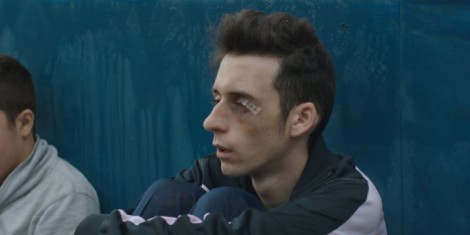
Directed and Written by: Sofia Exarchou
Starring: Dimitris Kitsos, Dimitra Vlagopoulou, Enuki Gvenatadze, Thomas Bo Larsen, Lena Kitsopoulou, Yorgos Pandeleakis
Produced by: Amanda Livanou, Christos V. Konstantakopoulos
Cinematography by: Monika Lenczewska
Edited by: Sofia Exarchou, Nikos Mavropsaridis
Music by: The Boy
World Premiere at the Toronto International Film Festival 2016
Official Selection of the 2017 San Francisco International Film Festival
*****
If Harmony Korine was put on mood stabilizers, he might have made Park, the internationally-acclaimed feature film debut of writer/director Sofia Exarchou.

Ostensibly a 100-minute walk through an arid Greece, where ruins of ancient democracy push up against the desecrated remains of the 2004 Olympics, Exarchou’s film mobilizes child actors in service of a sort of Tragedia dell’arte. In desolate Athens, the young charges – mostly hostile urban adolescents living on poverty’s edge – mercilessly rib and fuck with one another as a means of distraction.
But through the cacophonous din of her novice performers’ improv come flashes of major aesthetic inspiration, making this debut – which has screened at SFIFF60 and the Maryland International Film Festival – a powerful landmark in the Greek New Wave being shepharded by Park’s production company, Faliro House.
Exarchou sets her characters, like the brutishly handsome Dimitris (Dimitris Kitsos) and his spindly acolyte Markos (Enuki Gvenatadze), in a wasteland of ennui and hormones. Their relationship is, primarily, to cockfight with one another, looking for any opportunity to sexually humiliate or back-bite their “friends” if it means the group gets a good tussle.
The violence is not about causing pain, by any means; nor is it about turf, as these white-trash hooligans are not organized enough to join competitive gangs or plan out their misdemeanors. As Donald Trump once described it in a fit of racist abuse, the ne’er-do-wells of Park are mainly “wilding,” roaming for food and excitement like the feral dogs that Exarchou places opportunistically across the landscape.

In dress and behavior, the men recall the pornographically oversexed youngsters in Eliza Hittman’s equally distressing debut, It Felt Like Love. Exarchou, like Hittman or the Coen Brothers, has a strong sense of boredom-as-drive, and an intuition for how exhaustion with one’s general circumstances and setting can lead to explosively stupid behavior.
When an opportunity for real crime does crop up, it is sloppily and childishly executed, with Kitsos particularly anchored by the painful, unheeded remorse of a juvenile delinquent. His performance, above all, demonstrates Exarchou’s psychological insight: Dimitris is a hotbed of self-inflicted shame, castration, abuse, and desperation.
Dimitra Vlagopoulou plays Ana, a lone-wolf whose shy lust matches Dimitris’s masculine aggression, with a more muted style. The filmmaker’s script replaces dialogue with large patches of silence, and Vlagopoulou occupies those spaces with a humorless vacancy, sapping the roiling energy from her lover. This fascinating and sometimes grotesque dynamic stands-in for anything like romance or sexual excitement in the film – Kids this is certainly not.
In fact, any sense of kinetic fun that Korine has made a career in warping – his Trash Humpers is still the nastiest attack on personal leisure ever made – is gone from this movie, which operates in the same sort of humorously nihilistic atmosphere of which the Coens, Tsai Ming-liang, and Lars von Trier are fond.

Its miserablism is the result of spectacular work by DP Monika Lenczewska, who seems to stand dozens of feet from the actors with the grace of an expert anthropologist. The visual distance is both academic and curious, with Lenczewska moving into forceful close-ups in brief, punctuating shots of shocked disgust.
Lenczewska’s camera is also highly attentive to the large ensemble of actors, keeping their groups in nearly perfect coverage – the story is never confusing or randomly jumpy, as von Trier’s films can sometimes seem. This is an amazing trick, since Exarchou seems to have directed the actors with scenarios and warm-up games more than “traditional” techniques. She has even gone so far as to describe a manic scene where the boys and girls arm wrestle as a rehearsal. That Lenczewska and the editors, Exarchou and Nikos Mavropsaridis, keep such scenes comprehensible is technically astounding.
As one might imagine given this description, Park is more impressive for its assured aesthetic execution than it is enjoyable, and it lacks the freakish eccentricities of films like Yorgos Lanthimos’s or Athena Rachel Tsangari’s.
Where a film like Tsangari’s Chevalier situates its ensemble into a Greece threatened with symbolic castration at the hands of colonial Europe, Exarchou imagines a more desolate landscape, where austerity measures have left hordes of children aimless, and first-world pleasures like cinema, literature, or creative arts completely abandoned by the young.
The children in her film are not quirky, but the opposite: they are typically, dully, distressingly empty of distinctive qualities, with the lone exception of the sensitive Dimitris.
In Park, Exarchou thrusts you into a void of warmth or pleasure to get her points across. This ruthless strategy works: the film’s bleakness is beautiful, and its psychological tensions undeniably powerful, culminating in an encounter between Dimitris and an incautious traveling businessman (Thomas Bo Larsen, peerless as always.) But in this day and age, who wants to spend 2 hours in a deserted hellhole?
You should therefore not expect to see Park explode into international recognition with the regard of The Lobster or Attenberg. Though Exarchou has staged and directed the film masterfully, it remains more appropriate for the patient audiences of the international film festival circuit (it’s already available on Festival Scope) where any strict concepts of entertainment are sincerely secondary.

